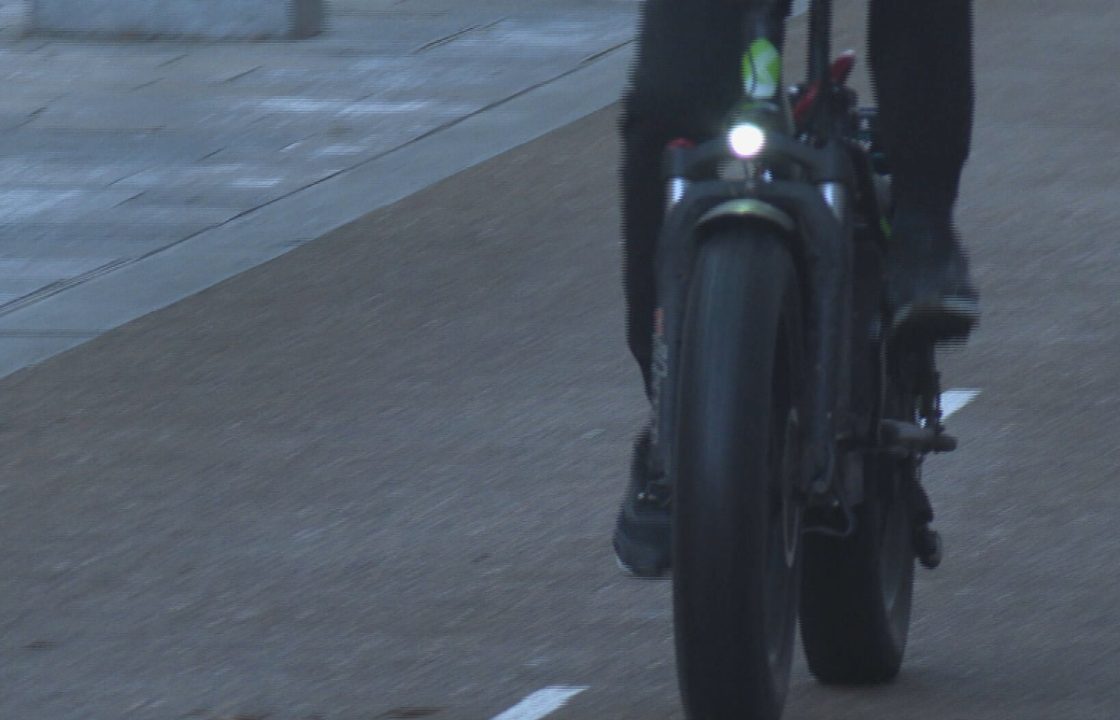Fears are growing over the threat posed by e-scooters and e-bikes to pedestrians, especially when they have been illegally modified to reach speeds of more than 30mph.
Those waiting for crucial legislation laying out the rules around responsible e-scootering were frustrated after there was no mention of the law in the King’s Speech last month.
The growing prevalence of souped-up electric bikes and e-scooters is making life especially hard for people like Colin and Lyn Hetherington, who rely on guide dogs when they’re visiting the city.
The Guide Dogs for the Blind Association said anti-social e-scooter use is particularly hazardous for people with sight loss due to their weight, speed and relative silence – and because they are often ridden on pavements.
Lyn says she and her dog almost got knocked down by an e-scooter when it came flying through a red light.
“They just come out of nowhere,” she told STV News. “I can’t see people coming, let alone e-scooters. They just come so close to you without hearing them, and they’re just on top of you.
“It is really scary and that took me a good while to get my confidence back up to go out by myself.
“Someone’s going get hurt. How badly I don’t know.”
Colin added: “I just think someone needs to take control of the situation and tighten it up and make it safer for everybody…not just guide dog owners, everybody, someone in a wheelchair, someone pushing a buggy…an old person walking with a stick.”
Electric bikes can be ridden by anyone over the age of 14 on bike paths, cycle lanes and roads and don’t require a licence – but they are not allowed on pavements.
They must also stop at stop signs and red lights and riders must use hand signals to turn. But if they’re illegally modified, they can reach much greater speeds than the current 15.5 mph limit.
Lyn said: “It’s something that goes through your head every time you go out to Glasgow or a busy area, whether you are actually going to come out without actually getting hurt by one of these things.”
E-scooters are widely sold across the country and are a fairly common sight on the streets.
But in Scotland, current regulations mean they can only be ridden on private land, with permission from the landlord.
A recent crackdown by police saw 15 e-bikes and e-scooters seized in Glasgow in just one weekend, and statistics from the Scottish Government show e-scooters have caused around 30 casualties in Scotland since 2021.
Elsewhere in the UK, 12 people died last year in accidents involving e-scooters.
Updated laws covering e-scooters weren’t mentioned when King Charles delivered the UK’s first King’s Speech in 70 years, setting out Prime Minister Rishi Sunak’s legislative plans for the upcoming year.
The delay to regulations has sparked criticism amid warnings of the dangers of the electric vehicles being used in public places when it is illegal.
Mark Bain from retailer Skootz says patience for retailers and customers is wearing thin.
“When customers come into the store, it’s really important to be upfront and honest, but there are about 1.2 million privately owned scooters out there already.
“So there’s a frustration from the public, because they’re not legal on the road, and for us if it goes any longer [without new regulatory framework], we’ll probably be out of business.”
He said the type of customer he was seeing instore had also changed over the years.
“In the beginning it was more of the balaclava-wearing young person that is that cliché… but now more and more it’s your businessman wanting to commute to the bank, or people wanting to use them for the school run,” he added.
Transport Scotland says ministers are keeping an eye on UK Government plans for potential e-scooter trials in Scotland, 23 of which are already live south of the border.
A spokesperson said: “The legal use of electric scooters and decisions around their introduction is broadly a reserved matter for the UK Government.
“The UK Government has stated its intention to bring forward a new regulatory framework for vehicles such as electric scooters, however the timescales for this are unclear.
“Enabling the use of electric scooters through such a regulatory framework would also require amendments to devolved legislation, therefore the Scottish Government are monitoring developments in this area and will continue to engage with the Department for Transport on this matter.”
The Guide Dogs for the Blind Association said it was disappointed by the delay to legislation and said the trial rental e-scooter schemes in towns and cities in England have also presented challenges, with rental e-scooters abandoned on pavements.
Clive Wood, the charity’s lead regional policy manager said: “At Guide Dogs we’re disappointed that the Government’s plans for the year ahead do not include any measures to tackle some of the most serious and long-running issues affecting people with sight loss.”
“We need new laws to tackle problem pavement parking, strengthen staff training to prevent guide dog access refusals, and address the problems caused by anti-social e-scooter use.
“While no bills have been announced to address these problems in the King’s Speech, there is nothing stopping the (UK) Government from introducing draft laws on these subjects at any point in the upcoming session of parliament, and we urge them to do so.”
Follow STV News on WhatsApp
Scan the QR code on your mobile device for all the latest news from around the country





























